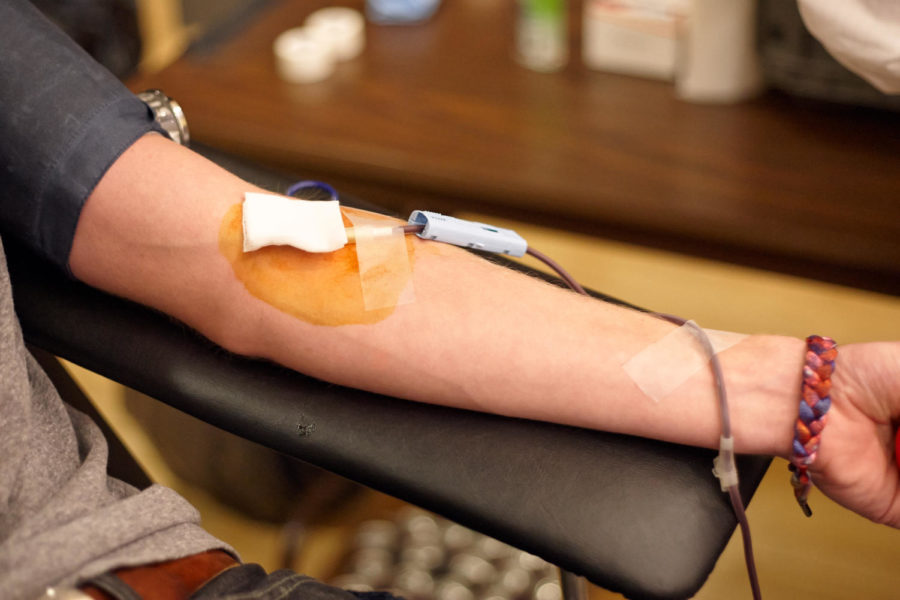ISU blood drive offers free checkup, chance to save multiple lives
Joe Waggoner, freshman in materials engineering, donates blood at the ISU blood drive.
March 24, 2015
Barricades of fear surround the noble cause of giving blood, and rumors of students fainting or feeling light headed have plagued the upper level of the Memorial Union this week.
However, you might be surprised with the unexpected health benefits of donating an hour of your day and a pint of that red fluid that runs through your veins.
The ISU Blood Drive has been set up in the Great Hall of the Memorial Union since Monday and will end Thursday at 5 p.m.
Students are welcome to stop by the drive at any available time to donate and participate in this spring’s theme, “Heroes Come in All Types.”
But you hate needles, the sight of blood makes you ill, and you’re too busy … so why should you bother making your way over to the ISU Blood Drive this week?
Not only does donating blood help save the lives of those in need, but it can also benefit your very own health and wellbeing.
Here are three health benefits of donating blood:
The physical that is received before donating blood serves as a free mini checkup.
Before students find themselves with a stress ball in hand, reclined at the donation station, they will first have to undergo a series of small physical tests. These tests will measure your body temperature, pulse, blood pressure and hemoglobin levels.
According to the Centers for Disease Control and Prevention, nearly 10 percent of women in the U.S. suffer from anemia, a condition where the body lacks red blood cells or hemoglobin. This mini physical will check for deficiencies like this, and it’s all free.
Once the pint of donated blood has been collected, it will be sent to one of the three Red Cross National Testing Laboratories, where the blood will undergo a dozen more tests to check the blood type as well as screen for any infectious diseases.
The key to a healthy life is knowledge and participating in physicals and mini checkups are a perfect way s to monitor and maintain your bodily health.
Donating can help regulate iron levels and increase blood flow.
According to health.com, healthy adults usually have about 5 grams of iron in their bodies. Most of this iron is stored in red blood cells and bone marrow.
The pint of blood that is collected through the donation process will reduce the amount of iron in your body by about a quarter of a gram, which the body will later replenish throughout the week from the food you eat. Having too much iron can be hazardous for vessel related diseases such as heart attack and stroke.
“I find it beneficial that donating will lower blood viscosity, which allows blood to flow throughout our body in a way that is less damaging to vessels and can reduce chances of life threatening problems,” said ISU Blood Drive director Kelly Wiens.
A pint now, a long life ahead.
Health Psychology conducted a study that connected a reduced risk of mortality with people who volunteer altruistically and for reasons other than personal gain.
“I donated this year at 10 a.m., right when blood drive opened,” said Michaela Berg, junior in event management. “When you donate blood, you can save up to three lives. I can count three people that are close to me and I think about them because I know that it could help and save people who mean as much to someone else as they do to me.”
The health benefits of donating blood are worthwhile, but time and time again, ISU students can be found in line to donate blood not just for a free mini checkup to regulate their iron levels, or for the free cookie. They donate to serve the greater cause and save the lives of up to three people.
“The act of donating blood gives recipients a second chance at life,” Wiens said. “And that’s reason enough for most of the students I see come through the Great Hall.”







